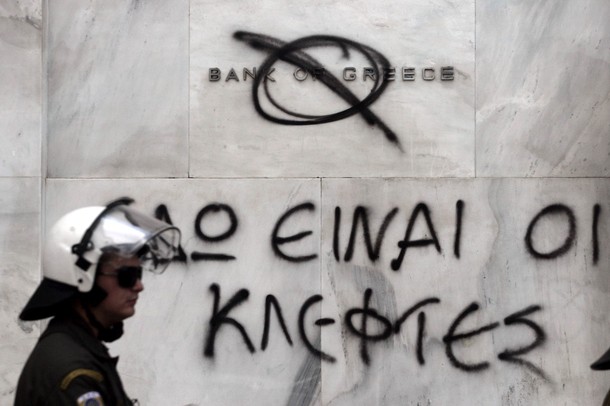
With the Greek rescue program, Europe, with a large dollop of help from the IMF, bought a reprieve from a full-blown market stampede. Yet, unusually for this stage of an IMF arrangement, markets remain deeply skeptical about its chances of success.
Greece is largely a plain vanilla fiscal crisis, more reminiscent of emerging market crises of the 1970s and 1980s than more recent crises such as the 1997 Asian private sector crises or transition country crises. Quite simply, for decades Greece indulged in unsustainable debt dynamics, whether openly or in backroom books running large fiscal deficits financed by sovereign debt.
But the Greek story has two twists.
First, Greece is not only an “advanced country,” where post-war debt crises have been rare, but also in the euro area, where a credible central bank, an (admittedly dysfunctional) fiscal rule, and some commonality in economic institutions underpinned implicit guarantees on sovereign debt. Markets were understandably slow to take a cold hard look at Greek debt until the numbers and outlook became dire.
Second, the fiscal problem could turn into a multi-country banking crisis and tear apart the young common currency. Sovereign debt is concentrated in Greek banks and other European banks. Any delay in servicing would pose immediate threats to the health of the Greek banking system, its sizable subsidiaries in Southeast Europe, and even balance sheets of Western European banks.
Calling in the IMF was for Europe both humiliating and hopeful. Humiliating, because it stated openly that European economic—and, by extension, political—governance had failed to prevent the most obvious of poor economic policies. Hopeful, because it embodied a decision to avoid a precipitous unilateral default and defend the integrity of the euro area. Resorting to the IMF—whose raison d’être is addressing crises in a way that minimizes the impact on international trade, payments and capital flows—meant Europe had agreed on financing and hard-core adjustment as the first line of attack.
The documents requesting the IMF lending arrangement—150 pages of letters, MOUs and technical discussion of quantified 5-year economic projections—describe a seemingly conventional strategy for IMF-supported programs. It boils down to four prongs: emergency financing sufficient to keep the government out of the medium-and long-term debt market for two years and thereafter a gradual return; specific and large measures to reduce the fiscal deficit; measures to improve the supply side of the economy and alleviate exclusive reliance on demand restraint; preemptive protection of the domestic banking system through a funded domestic emergency financing facility.
The program however is hindered by spoken and unspoken constraints.
First, normally a large devaluation—extremely effective in cutting labor costs and improving supply conditions—would be part of such a program. Greece instead must rely on wage cuts and deal with resulting deflation. Devaluations are also immensely helpful for attracting back foreign investors.
Second, the program cannot rely on demand-restraining short-term interest rate increases and indeed must contend with the exceptionally low euro interest rate.
Third, with adjustment so centered on deficit reduction, the measures and the speed with which they must be introduced are exceptional, especially in a country with weak political cohesion.
Fourth, Greece faces a bad export market—the IMF predicts European growth of less than 1 ½ percent for several years.
So is the program a wish and a prayer? Not entirely. The program is coherently quantified. For the next 1-2 years (though critically not beyond), measures underpinning the deficit projections are specified (though it is less clear that they have all been enacted or, for those that have, that they are safe from reversal). The forecasts for modest drops in output and employment through 2011 may well be too small, though they are not implausible. The debt projections are not excessively sugar-coated: for example, they recognize that the fiscal measures will not prevent a further rise in debt to 150 percent of GDP in 2013 and that debt will only move to a downward path if further improvements in the fiscal balance occur after the end of the current program.
But for all these positives, only a little bit of bad luck would send Greece to default unless the euro area and the IMF are ready to redouble their commitment. There is scant room built into the projections for unexpected bad outcomes of domestic or external origin. This is important as projections for investment, employment, growth as well as fiscal outcomes are essentially shots in the dark given the uncertainties at so many technical, not to speak of political, levels.
Safety margins are also meager on the financing side. The program expects no increase in short-term external debt, but it does assume that both the government and banks can sustain their presence in short-term markets. Fine, as long as the ECB can continue to discount Greek paper without raising doubts about its balance sheet. Most startling is that the government is envisaged to return to the bond market in 2012 with debt/GDP still headed to 150 percent of GDP. Yet three years is short for addressing such a huge problem, and Greece will surely have a follow-up IMF lending arrangement. The question then is “Are the IMF and euro area really in this for the long haul?”
The answer may be built into a sentence sitting in a passage near the end of the IMF staff report. “There may be scope to bolster [market access] by seeking coordinated voluntary rollover understandings among creditor groups.” Perhaps, then, the whole program is less conventional than it appears. It would be a first for the IMF to be consciously adopting a strategy of buying time for a rescheduling.
Susan Schadler is a non-resident Senior Fellow with the Atlantic Council and formerly Deputy Director of the IMF’s European Department. Photo credit: Getty Images.
Image: Bank%20of%20greece.jpg

